The Möbius Advantage: Discover the Perfect Fit for STEM Education
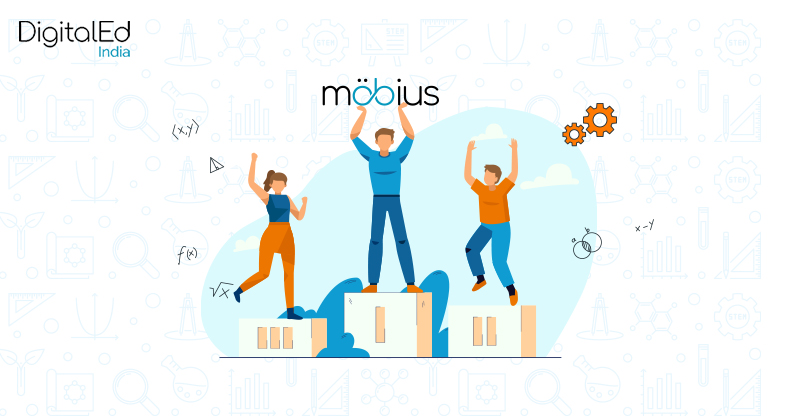
In the ever-evolving landscape of digital education, the quest for enriching STEM learning experiences reaches new frontiers. Today, we embark on an in-depth analysis, dissecting different educational platforms along with the Möbius platform, aiming to transform how we engage with Science, Technology, Engineering, and Mathematics.
Let’s delve into the intricacies of each platform, unraveling their unique strengths and unveiling the ideal path to STEM education.
1. Möbius & Google Classroom – Navigating the Digital Classroom Landscape
Both Möbius and Google Classroom play crucial roles in the digital classroom, but their approaches to fostering STEM learning differ significantly. Google Classroom excels in streamlining communication, organizing assignments, and simplifying online collaboration. Möbius, on the other hand, ventures deeper, aiming to revolutionize STEM education with its PHYGITAL blend of interactive lessons, personalized learning pathways, and advanced assessment tools. This fundamental distinction shapes their strengths, weaknesses, and suitability for different educational needs.
Let’s dive deeper:
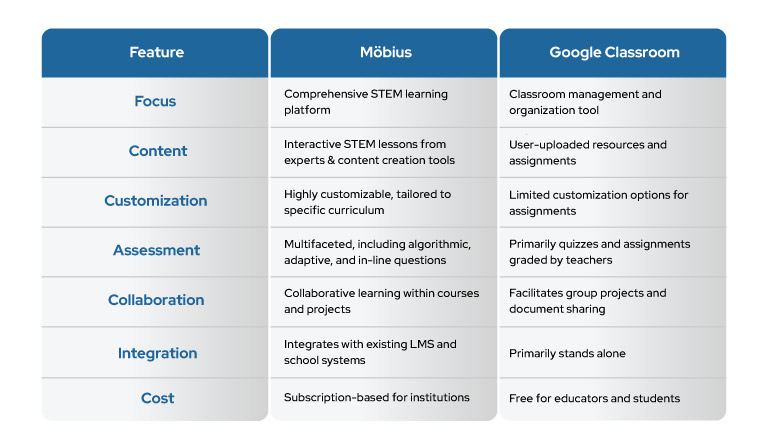
2. Möbius & Coursera – An Evolving Landscape of STEM Learning
While both Möbius and Coursera serve as gateways to enriching STEM education, their approaches diverge at the crossroads of pedagogy and reach. Coursera, a titan in the MOOC (Massive Open Online Courses) realm, caters to individual learners seeking targeted skill development or career advancement. Möbius, conversely, positions itself as a comprehensive PHYGITAL ecosystem, designed to seamlessly blend digital learning into the existing curriculum of schools and universities. This fundamental difference shapes their strengths, weaknesses, and target audiences.
Let’s delve deeper and discuss their unique offerings:
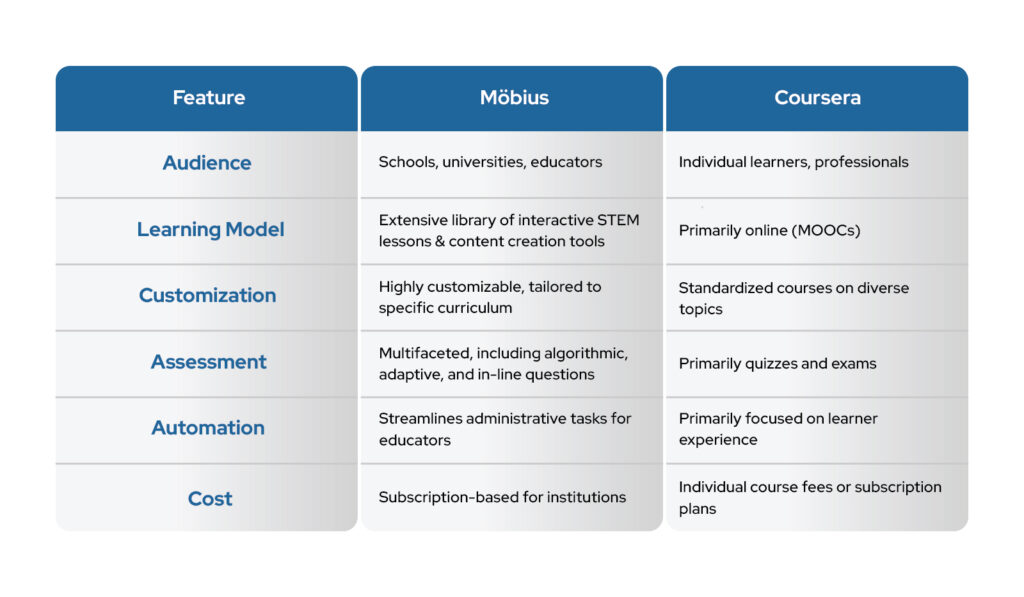
3. Möbius & Udemy – Tools for Institutional vs. Individual Learning
Both Möbius and Udemy champion the democratization of STEM education, yet their paths diverge at the intersection of target audiences and course delivery. Udemy, a household name in online learning, empowers individuals to acquire new skills through a vast marketplace of instructor-led courses. Möbius, on the other hand, focuses on equipping institutions with a comprehensive PHYGITAL ecosystem that seamlessly blends digital learning into the existing curriculum. This fundamental distinction shapes their strengths, weaknesses, and ideal user profiles.
Let’s discuss their unique offerings:
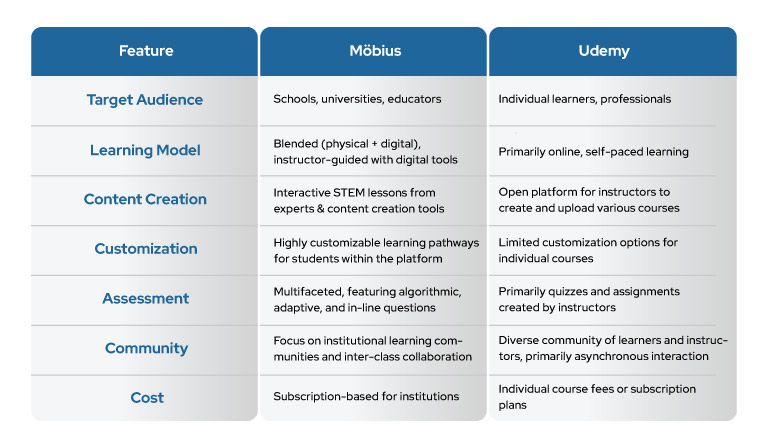
4. Möbius & Unacademy – Enriching the STEM Education Landscape
Both Möbius and Unacademy serve as compass points in the vast ocean of STEM education, but their navigational tools and chart styles differ significantly. Unacademy, a titan in the Indian online learning space, offers a diverse range of instructor-led courses across various disciplines, including STEM. Möbius, in contrast, charts a unique course as a PHYGITAL ecosystem designed to seamlessly integrate digital lessons into existing school and university curricula.
Navigating between these platforms boils down to understanding their strengths and weaknesses:
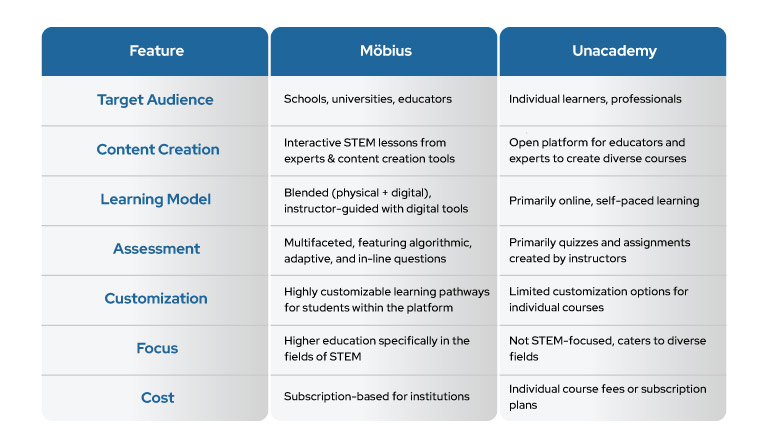
5. Möbius & Teachmint – Crafting Engaging Learning Spaces
Both Möbius and Teachmint weave intricate tapestries of STEM learning, but their techniques and threads differ significantly. Teachmint, a rising star in the online classroom space, empowers educators to create interactive virtual classrooms and conduct live sessions across various subjects, including STEM. Möbius, conversely, paints with broader strokes, crafting a PHYGITAL ecosystem that seamlessly blends digital lessons and assessments into existing school and university curricula.
Let’s explore the unique learning experiences they create:
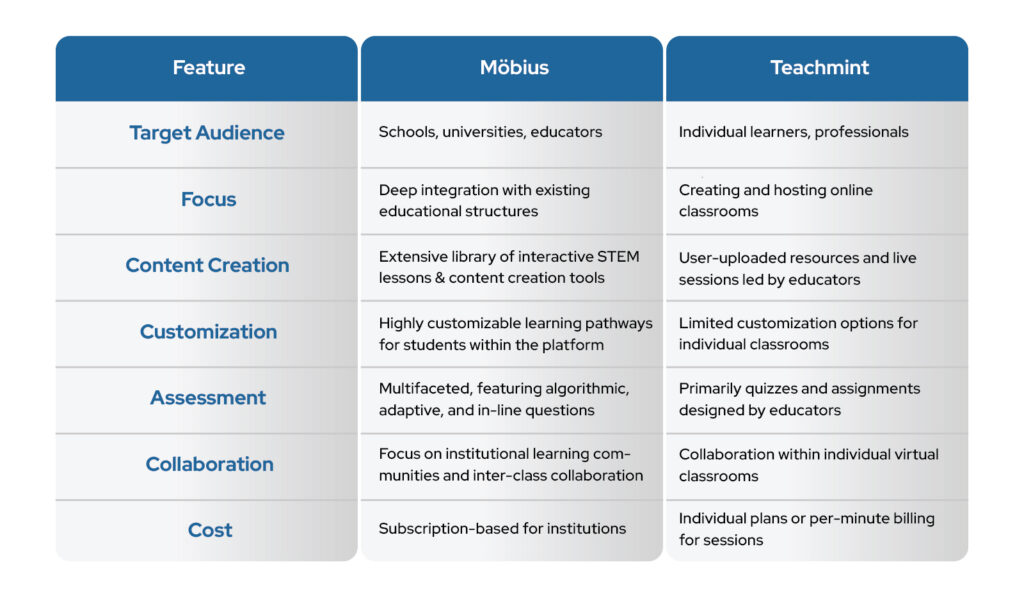
6. Möbius & Khan Academy – Bridging the Digital Divide
Both Möbius and Khan Academy aim to bridge the digital divide in STEM education, but their approaches diverge at the crossroads of personalized learning and content ownership. Khan Academy, a global icon in free online education, offers a vast library of self-paced video lessons and exercises across various subjects, including comprehensive STEM offerings. Möbius, in contrast, positions itself as a PHYGITAL ecosystem designed to empower educators within schools and universities with tools to personalize learning for their students within a controlled environment.
Let’s dissect their unique offerings:
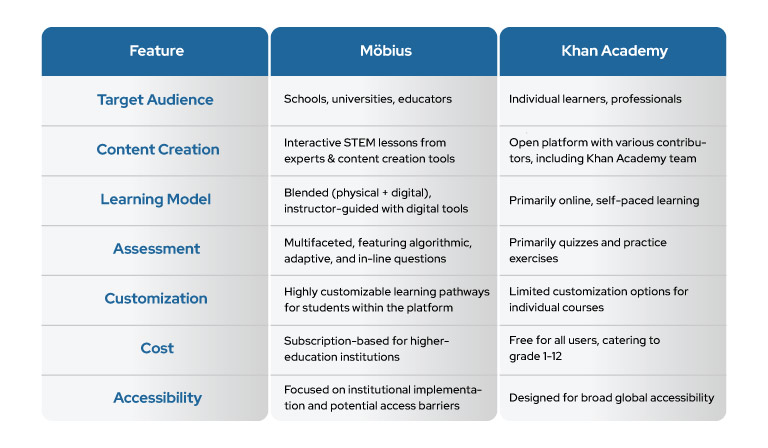
As we conclude our exploration of these diverse platforms, one thing is clear: the landscape of STEM eAs we conclude our exploration of these diverse platforms, one thing is clear: the landscape of STEM education is undergoing a transformative journey. While each platform boasts its own strengths and caters to specific needs, Möbius, by DigitalEd India, stands out with its unique PHYGITAL approach. It empowers educators to curate personalized learning journeys and assessments within the familiar walls of their institutions, seamlessly weaving digital threads into the existing curriculum. This blended approach fosters a sense of community and collaboration, while simultaneously offering the flexibility and depth of digital resources.
The choice ultimately lies in your hands. Do you seek a vast ocean of independent learning opportunities? Or do you prefer a guided pathway tailored to your student’s individual needs within a secure and controlled environment? Möbius, with its commitment to personalized learning and deep integration with existing educational structures, offers a compelling answer to the evolving needs of STEM education.
Want to explore the Möbius experience? Book a personalized demo!